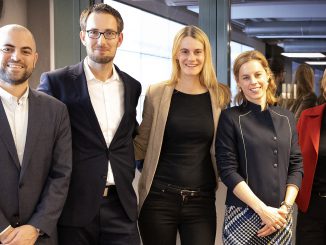
Impact investing has raised growing interest over the past, and while it was long associated mainly with institutional and high net-worth investors, the investing approach is currently on the verge of breaking into the mainstream market. Individual investors, too, are interested in putting their capital to work for positive change (Bouri et al., 2018). Consequently, several banks and financial firms – among them name-brand players such as Goldman Sachs, Morgan Stanley, and BlackRock – launched mainstream products to meet an increasing consumer demand for investment options that reflect social and environmental values.
As one of the most prominent investment vehicles among retail investors, impact mutual funds have the potential to be a driver for the growth of the impact investing industry and to overcome the funding gap for societal issues. Since large-scale banks and financial institutions recognized the demand for more sustainable investment products, the number of mutual funds tagged with the terms impact, ethical, fair, green etc. rose sharply.
Against this background, a study at the Munich Business School evaluated 102 mutual funds on their compliance with the concept of impact investing and the expectations connected to the strategy. The funds were analyzed with respect to the high-level defining characteristics of impact investing, namely
(1) the intention to generate social or environmental impact,
(2) the assessment of this impact and
(3) the achievement of a financial return with this investment.
The study revealed that the majority of funds orientate towards the concept of social and environmental sustainability but miss the defining impact investing aspects to intentionally generate measurable impact.
Impact investing requires to measure intentional impact
While also striving for financial returns, at the heart of impact investing lies the objective to create social or environmental impact. While every form of investing has some social or environmental impact, for impact investing it needs to be intentional and not a product of coincidence. Thereby, impact is described as the difference in outcomes between what happened due to a given action and what would have happened anyway (Olsen & Galimidi, 2008). Brest and Born note that investors create impact only if the quantity or quality of the investee’s output is increased “beyond what would otherwise have occurred” (Brest & Born, 2013, p.24). In contrast, the prevalent definition of impact in Continental Europe, understands it as the long-term effects of interventions that go beyond the primary target group and reach additional beneficiaries, while outcomes refer to the change effected within the primary target group (Epstein & Yuthas, 2017).
To overcome the subjectivity bias of intentionality, impact measurement as part of impact assessment is a particularly crucial and inevitable aspect of impact investing (Social Impact Investment Taskforce, 2014). Without objective, transparent and accurate data on environmental and social return, impact investors cannot ensure they are achieving positive change and impact investing would not differ from traditional investing. Investors reportedly measure impact to better understand the effects of an investee‘s activities and to leverage the process of value creation (Hornsby & Blumberg, 2013).
Most funds do not classify as impact investing
Already the examination whether the most basic processes required to meet the requirements for impact intention and measurement are implemented, proofs that almost all funds of the research sample are ineligible as impact investing instruments. Even though a larger number of funds includes extra-financial aspects in screening, performance measurement and reporting processes, only for a few these processes can be declared as impact. Merely two of 102 funds could be taken into closer consideration to be an eligible impact investing instrument. Even more: If a market-rate, or slightly below market-rate, financial return is considered essential for an impact investing vehicle, investors are left with only one single investment option.
Based on the study findings, it must be clearly stated that mutual fund investing demonstrates a limited suitability for retail impact investors. While mutual fund investing shall not be considered as incompatible with impact investing per se, this is the case at the time of this writing. Given the popularity of mutual fund investing among mainstream investors, the development of a greater range of products classifiable as impact investing solution would be highly desirable. Not only would it allow consumers to align investments with their moral ideals and ethical values, it also would account for a major contribution to reach the UN Sustainable Development Goals (SDGs) and to solve societal problems. Consequently, financial organizations but also public institutions, intermediaries, and enablers should have an interest in promoting this progression and support the creation of a favorable market environment.
Find the complete study here: Klaiber, J., Scheck, B., & Schmidkonz, Ch. (2019). Do Impact Investments Deliver on Their Promise? Assessing Mutual Funds as Vehicles for Retail Impact Investments. Munich Business School Working Paper Series (ISSN 2367-3869), 2019-01.





